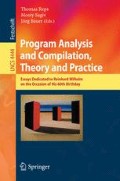Abstract
We review Wilhelm’s work on WCET for hard real-time applications and also recent work on analysis of soft-real time systems using probabilistic methods. We then present Probabilistic Abstract Interpretation (PAI) as a quantitative variation of the classical approach; PAI aims to provide close approximations – this should be contrasted to the safe approximations studied in the standard setting. We discuss the relation between PAI and classical Abstract Interpretation as well as average case analysis.
Access this chapter
Tax calculation will be finalised at checkout
Purchases are for personal use only
Preview
Unable to display preview. Download preview PDF.
References
Wilhelm, R.: Timing analysis and timing predictability. In: de Boer, F.S., et al. (eds.) FMCO 2004. LNCS, vol. 3657, pp. 317–323. Springer, Heidelberg (2005)
Shaw, A.: Reasoning about time in higher-level language software. IEEE Transactions on Software Engineering 15, 875–889 (1989)
Lundquist, T., Stenström, P.: Timing anomalies in dynamically scheduled microprocessors. In: 20th IEEE Real-Time Systems Symposium (1999)
Balbo, G.: Introduction to stochastic Petri nets. In: Brinksma, E., Hermanns, H., Katoen, J.-P. (eds.) EEF School 2000 and FMPA 2000. LNCS, vol. 2090, pp. 84–155. Springer, Heidelberg (2001)
Bause, F., Kritzinger, P.S.: Stochastic Petri Nets – An Introduction to the Theory, 2nd edn. Vieweg Verlag, Wiesbaden (2002)
Plateau, B., Atif, K.: Stochastic automata network of modeling parallel systems. IEEE Transactions on Software Engineering 17, 1093–1108 (1991)
Norman, G., et al.: Formal analysis and validation of continuous time Markov chain based system level power management strategies. In: Rosenstiel, W. (ed.) Proc. 7th Annual IEEE International Workshop on High Level Design Validation and Test (HLDVT’02), pp. 45–50. IEEE Computer Society Press, Los Alamitos (2002)
Di Pierro, A., Wiklicky, H.: Concurrent Constraint Programming: Towards Probabilistic Abstract Interpretation. In: Gabbrielli, M., Pfenning, F. (eds.) Proceedings of PPDP’00 – Priciples and Practice of Declarative Programming, Montréal, Canada, ACM SIGPLAN, pp. 127–138. Association of Computing Machinery (2000)
Cousot, P., Cousot, R.: Abstract Interpretation and Applications to Logic Programs. Journal of Logic Programming 13, 103–180 (1992)
Abramsky, S., Hankin, C. (eds.): Abstract Interpretation of Declarative Languages. Ellis-Horwood, Chichester (1987)
Nielson, F., Nielson, H.R., Hankin, C.: Principles of Program Analysis. Springer, Heidelberg (1999)
Di Pierro, A., Wiklicky, H.: Measuring the precision of abstract interpretations. In: Lau, K.-K. (ed.) LOPSTR 2000. LNCS, vol. 2042, pp. 147–164. Springer, Heidelberg (2001)
Monniaux, D.: Abstract interpretation of probabilistic semantics. In: Palsberg, J. (ed.) SAS 2000. LNCS, vol. 1824, Springer, Heidelberg (2000)
Monniaux, D.: Abstract interpretation of probabilistic semantics. In: Palsberg, J. (ed.) SAS 2000. LNCS, vol. 1824, pp. 322–339. Springer, Heidelberg (2000)
Eaton, J.: Gnu Octave Manual (2002), http://www.octave.org
Cousot, P., Cousot, R.: Systematic Design of Program Analysis Frameworks. In: Symposium on Principles of Programming Languages (POPL), San Antonio, Texas, pp. 269–282 (1979)
Deutsch, F.: Bet Approximation in Inner Product Spaces. CMS Books in Mathematics, vol. 7. Springer, New York (2001)
Ben-Israel, A., Greville, T.: Generalised Inverses — Theory and Applications, 2nd edn. CMS Books in Mathematics, vol. 15. Springer, New York (2003)
Di Pierro, A., Hankin, C., Wiklicky, H.: Probabilistic chemical abstract machine and the expressiveness of linda languages. In: de Boer, F.S., et al. (eds.) FMCO 2005. LNCS, vol. 4111, pp. 388–407. Springer, Heidelberg (2006)
Di Pierro, A., Hankin, C., Wiklicky, H.: Quantitative static analysis of distributed systems. Journal of Functional Programming 15, 1–47 (2005)
Author information
Authors and Affiliations
Editor information
Rights and permissions
Copyright information
© 2007 Springer Berlin Heidelberg
About this chapter
Cite this chapter
Di Pierro, A., Hankin, C., Wiklicky, H. (2007). Abstract Interpretation for Worst and Average Case Analysis. In: Reps, T., Sagiv, M., Bauer, J. (eds) Program Analysis and Compilation, Theory and Practice. Lecture Notes in Computer Science, vol 4444. Springer, Berlin, Heidelberg. https://doi.org/10.1007/978-3-540-71322-7_8
Download citation
DOI: https://doi.org/10.1007/978-3-540-71322-7_8
Publisher Name: Springer, Berlin, Heidelberg
Print ISBN: 978-3-540-71315-9
Online ISBN: 978-3-540-71322-7
eBook Packages: Computer ScienceComputer Science (R0)

